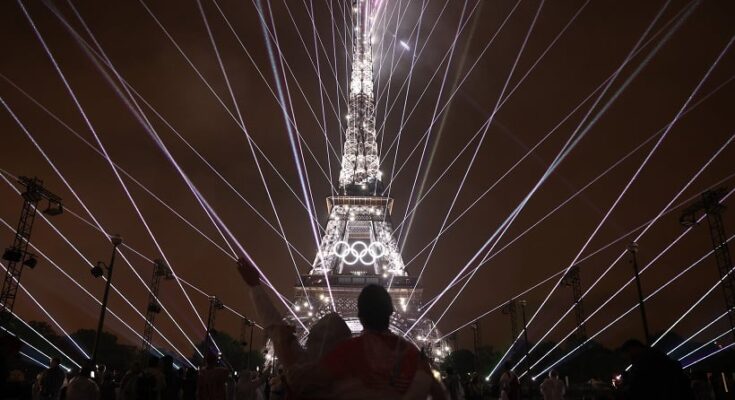The Opening Ceremony of the Paris 2024 Olympic Games presented on Friday, July 26, offered millions of viewers worldwide a spectacular show that justified the French capital’s reputation as the City of Love, City of Light, and Europe’s most acclaimed hub for artistic creativity over centuries.
Taken out of the stadium and staged afloat and along the Seine, the ceremony was also enjoyed by tens of thousands of onlookers who braved the rain to watch the once-in-a-lifetime experience from bridges, balconies and riverbanks.
Strong female narrative and inclusivity
Besides the apparent mistake of an Olympic flag having been worn upside down as a cape by one of the show’s key performers, the Opening Ceremony for Paris 2024 was flawless, featuring several artistic highlights and serving food for thought that international critics either loved or hated.
A masked and hooded character was the superhero of the show, dancing, running and riding through its main features. It is understood that the role was undertaken by different individuals, as suggested by the changing bodytype during different parts of the show.
Starting from historical references to the bloodshed during the French Revolution and the Reign of Terror, the scenario also often turned the spotlight on lesser known legends, achievements and personalities of the country’s long past, all the while vibrating an electro-pop aesthetic injected with influences that ranged from classical ballet to goth and metal.
Overall, the show had a strong female narrative, highlighting the impact of pioneering French women who have been less visible than the globally renowned great French men artists and intellectuals.
Inclusivity was also omnipresent, thanks to the participation of performers and athletes of all genders, backgrounds, and ages, such as the oldest living French Olympic medalist, who carried the torch in wheelchair.
The strong presence of LGBTQI+ performers was widely and variously commented on by social media users and conventional media around the world. Among the most controversial highlights was the drag queen revival of Da Vinci’s Last Supper.
Celine Dion stuns viewers with Eiffel Tower performance
Iconic international and French performers, like Lady Gaga and Aya Nakamura, performed at the Opening Ceremony of Paris 2024, but the most mesmerising stage performance was undoubtedly that of French-Canadian music diva Celine Dion.
Standing on a stage on Eiffel Tower, the award-winning artist masterfully sang the Hymn to Love, which was originally written and performed by the legendary Edith Piath.
The song, released in 1950, spoke of how true love knows no borders.
The anticipated appearance, which had been rumored for awhile but never confirmed, was the first stage performance by Celine Dion since she revealed her agonising battle with the Stiff Person Syndrome – an incurable neurological condition.
The Eiffel Tower was illuminated with and projecting colorful lights throughout the last part of the Opening Ceremony.
The Flying Olympic Flame Cauldron
Inspired by aviation pioneers the Montgolfier Brothers, the French created an airborne cauldron in form of a hot air balloon to carry the Olympic Flame during the Games.
An undeniable highlight of the Opening Ceremony was the moment when the two torch bearers, one male and one female athlete, touched the Flame on the cauldron, seemingly setting it on fire as the construction was released from the ground and into the air.
The innovative airborne Olympic Flame cauldron will continue to hover at 30m high every evening until August 11 on the same static spot from where the Montgolfiers’ first hot air balloon took to the skies in 1783.

The catwalk bridge and dancing platform
The French tradition in dance and fashion were reflected in the Opening Ceremony in multiple parts of the show.
Some of the early acts, like the one by Lady Gaga, were directly referencing the famous Parisian cabaret shows.
Classical ballet was performed by groups and solo dancers on famous landmarks throughout the evening.

But the versatility of the acts and costumes, matched by their upbeat, festive mood, took the show beyond the creative limits of the Moulin Rouge or the Opera into more contemporary movements.
As the sun set, a footbridge was transformed into a vibrant catwalk featuring noisy performers above the Seine, while more dancers performed their lively choreographies aboard a floating platform in the river underneath.
Earlier, acrobats were seen performing atop pin-like metallic posts on the riverbank, under the eye of stunned residents of nearby buildings.
References on Greek Mythology during the Paris Olympics Opening Ceremony
Unsurprisingly, alongside the world-famous divas performing for the Paris 2024 Opening Ceremony, and all the cultural and technological highlights, viewers could also notice a few references on ancient Greece, as well.
Traditionally, like in every Olympiad, the Greek mission led the athletes’ parade in akcnowledgement of Greece as the birthplace of the Olympic Games.
Similarly, the ceremony featured in its original Greek language version, as always, the Olympic Hymn, written by the acclaimed 19th century Greek poet Kostis Palamas.
In the clips created by Paris 2024 to air during the show’s broadcast there were close shots of the famous ancient Greek statue Aphrodite of Milos, which is on display at the Louvre. Another clip showed the Olympian Gods, designed in AI, coming alive and running to the windows of the Louvre to supposedly watch the parade.
But the most talked-about reference of the Opening Ceremony to the Greek mythology was French performer Philippe Katherine’s act disguised as Dionysus, the Greek of festivity and chaos.
Painted in blue, semi-naked, and literally lying in a platter, the French eccentric performed a song about how all people are essentially the same when naked – hence equals and mortals.
While the choice of color for his body painting caused critics to dub Philippe Kathrine “Papa Smurf,” it is understood that the artist opted for blue to mock skin color prejudice and sterotypes, thus embracing the message of universality carried by the spirit of the Olympic Games since antiquity.



